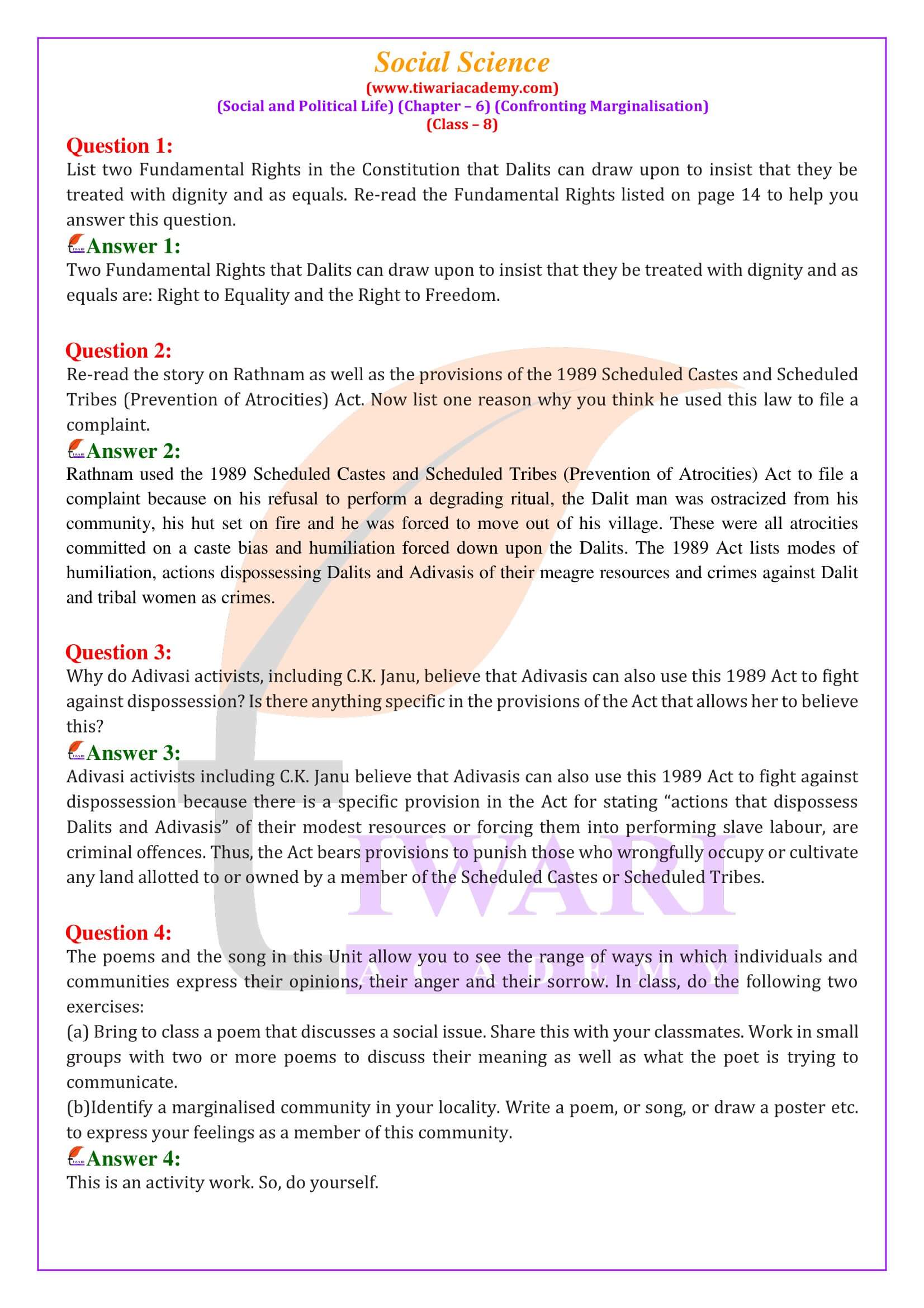NCERT Solutions for Class 8 Social Science Civics Chapter 6 Confronting Marginalisation in Hindi and English Medium (Unit 4 of Social and Political Life – III ) modified for session 2025-26. Class 8 Political Science Chapter 6 solutions are revised and updated according to rationalised books published for academic year 2025-26 exams.
NCERT Solutions for Class 8 Social Science Civics Chapter 6
| Class: 8 | Political Science |
| Subject: | Social Science – Civics |
| Chapter 6: | Confronting Marginalisation |
| Academic Session: | 2025-26 |
Extra Questions on 8th Civics Chapter 6
What are the role of government for the Marginalised?
The government makes laws to protect its citizens. Yet, this is not the only way in which it takes action. There are specific laws and policies for the marginalised in our country. There are policies or schemes that emerge through other means like setting up a committee or by undertaking a survey etc. The government then makes an effort to promote such policies in order to give opportunities to specific groups.
What is meant by Promoting Social Justice?
As part of their effort to implement the Constitution, both state and central governments create specific schemes for implementation in tribal areas or in areas that have a high Dalit population. In addition to providing certain facilities, the government also operates through laws to ensure that concrete steps are taken to end inequity in the system. The Reservation Laws which reserve seats in education and government employment for Dalits and Adivasis are based on an important argument- that in a society like ours, where for centuries sections of the population have been denied opportunities to learn and to work in order to develop new skills or vocations, a democratic government needs to step in and assist these sections.
What are the ways to Protecting the Rights of Dalits and Adivasis?
In addition to policies our country also has specific laws that guard against the discrimination and exploitation of marginalised communities.
Class 8 Civics Chapter 6 Question Answers
CBSE NCERT Solutions for Class 8 Social Science Civics Chapter 6 Confronting Marginalisation updated form for session 2025-26. Download these solutions for offline use or use as it is without downloading online. No login or registration is required for the access of contents.
Important Questions on 8th Civics Chapter 6
List two Fundamental Rights in the Constitution that Dalits can draw upon to insist that they be treated with dignity and as equals. Re-read the Fundamental Rights listed on page 14 to help you answer this question.
Two Fundamental Rights that Dalits can draw upon to insist that they be treated with dignity and as equals are: Right to Equality and the Right to Freedom.
Re-read the story on Rathnam as well as the provisions of the 1989 Scheduled Castes and Scheduled Tribes (Prevention of Atrocities) Act. Now list one reason why you think he used this law to file a complaint.
Rathnam used the 1989 Scheduled Castes and Scheduled Tribes (Prevention of Atrocities) Act to file a complaint because on his refusal to perform a degrading ritual, the Dalit man was ostracized from his community, his hut set on fire and he was forced to move out of his village. These were all atrocities committed on a caste bias and humiliation forced down upon the Dalits. The 1989 Act lists modes of humiliation, actions dispossessing Dalits and Adivasis of their meagre resources and crimes against Dalit and tribal women as crimes.
Why do Adivasi activists, including C.K. Janu, believe that Adivasis can also use this 1989 Act to fight against dispossession? Is there anything specific in the provisions of the Act that allows her to believe this?
Adivasi activists including C.K. Janu believe that Adivasis can also use this 1989 Act to fight against dispossession because there is a specific provision in the Act for stating “actions that dispossess Dalits and Adivasis” of their modest resources or forcing them into performing slave labour, are criminal offences. Thus, the Act bears provisions to punish those who wrongfully occupy or cultivate any land allotted to or owned by a member of the Scheduled Castes or Scheduled Tribes.
What does Article 17 of the Constitution states about untouchability?
Article 17 of the Constitution states that untouchability has been abolished – what this means is that no one can henceforth prevent Dalits from educating themselves, entering temples, using public facilities etc. It also means that it is wrong to practise untouchability and that this practice will not be tolerated by a democratic government. In fact, untouchability is a punishable crime now.
How does the reservation policy work?
Governments across India have their own list of Scheduled Castes (or Dalits), Scheduled Tribes and backward and most backward castes. The central government too has its list. Students applying to educational institutions and those applying for posts in government are expected to furnish proof of their caste or tribe status, in the form of caste and tribe certificates. (Many government and educational institutions also ask for candidates to mention their caste/tribe status.) If a particular Dalit caste or a certain tribe is on the government list, then a candidate from that caste or tribe can avail of the benefit of reservation.
Important Notes on 8th Civics Chapter 8
Statement of article 17 of the Constitution:
Article 17 of the Constitution states that untouchability has been abolished – what this means is that no one can henceforth prevent Dalits from educating themselves, entering temples, using public facilities etc.
It also means that it is wrong to practise untouchability and that this practice will not be tolerated by a democratic government. In fact, untouchability is a punishable crime now.




